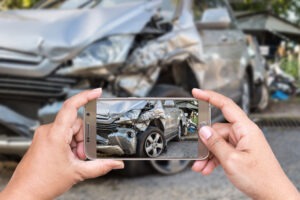
If you’ve been in an auto collision, you might be in shock and unsure about what to do next. One of the most important things you can do is take a deep breath, stay calm, and follow Vaughan & Vaughan’s car accident checklist.
The car accident attorneys at our firm have designed this post-accident checklist to help you protect your health and your right to compensation after a collision. Taking these steps will dramatically increase your chances of receiving a settlement or court verdict that’s large enough to cover all of your accident-related expenses.
Prioritize Your Health and Safety
While filing a claim and seeking damages after a collision is important, your well-being is the most important part of the situation. That’s why the first step you should take after an accident is to assess your injuries and determine whether or not you need immediate medical attention.
If your injuries are severe, call 911 and wait for the ambulance to arrive. If you’re able, you can move your car to a safe area while you wait for first responders to arrive. If your injuries are mild, you should still seek medical attention, but it would be in your best interests to take the following actions first.
Contact Local Law Enforcement
According to Indiana Code Title 9. Motor Vehicles § 9-26-1-1.1, most car accidents must be reported to the local police department or county sheriff. While calling the police after an accident is required by law, it can also help you build a strong personal injury claim when it’s time to pursue compensation.
That’s because the officers who respond to your accident will file an official accident report. Your attorney can use this report later as evidence for your claim. However, it’s important to note that the responding officers will likely ask you for a statement. Make sure that you tell the office the truth, but don’t apologize or admit fault, as that could be used against you.
Take Down the Other Driver’s Information
Once the police have conducted their investigation of the car accident, you’ll need to take down the other driver’s information. Ask them for their name, contact information, and their insurance information. Having these details will allow your attorney to file a claim with the at-fault driver’s insurance provider and pursue the damages you’re owed.
If you feel uncomfortable speaking to the driver or if they refuse to give you the information you need, the police can step in and facilitate the process.
Document the Accident
Once you’ve exchanged information with the other driver, it’s time to document the collision. First, take out your smartphone and photograph all vehicles involved in the crash. You’ll want to take close-up shots of any dented bumpers, scratches, and other forms of vehicle damage.
Make sure to take pictures of any guard rails, signs, or other objects that were damaged in the incident. Once you’ve photographed the scene of the crash, take a few photos of your injuries. Since cuts and bruises can sometimes fade quickly, it can be helpful to have a record of your injuries as they looked right after the collision occurred.
In addition to documenting the scene of the accident, you should also keep a written record of how the crash impacts your daily life. Make sure to note any physical pain, emotional distress, or quality of life issues you experience in the days and weeks following the incident.
An attorney can use your written testimony along with the photos you take to build a claim that convinces insurers that you deserve fair payment for your medical bills, vehicle repair costs, and other losses.
Talk to Eye-Witnesses
This post-crash checklist for car accident victims would be incomplete without a section about eyewitnesses. If there were any pedestrians nearby when the crash occurred or another motorist got out of their car to check on you, ask them what they saw and heard. If they witnessed the collision you were injured in, they could prove invaluable to your case.
If you speak to anyone with a clear view of the incident, ask them if they’d be willing to give your attorney an account of what they witnessed. If they agree to help, their testimony could make a world of difference in your case.
Don’t Post on Social Media
In the days following your accident, you might think to post on social media to update your friends and family about the collision you were injured in. While social media is a great way to keep in touch with your loved ones, it isn’t the best platform for discussing accidents that are pending investigation.
That’s because the insurance company will likely review your social media profile in search of any information they can use to discredit your claim. If you post a picture of yourself or a status about the collision, it could be misconstrued and used against your claim.
Don’t Wait to Hire a Lawyer
Once you’ve completed all the items on this car accident checklist, you’ll want to start looking for an attorney to help you with your personal injury claim. It’s important that you hire a lawyer as soon as possible, as the state of Indiana has a statute of limitations for civil lawsuits.
Under Ind. Code § 34-11-2-4, you have two years from the date of your crash to file a car accident lawsuit. If your suit is submitted even a few days after the filing deadline, you could risk forfeiting the compensation you need to support your recovery.
Don’t jeopardize your future by delaying your claim. Instead, reach out to an experienced attorney today. They’ll be able to answer any questions you have about the statute of limitations and budget their time effectively, ensuring your suit is submitted on time.
Schedule a Free Consultation With a Car Accident Attorney Today
Now that you’ve completed our checklist for car accident victims, it’s time to get started on your claim. If you don’t have legal counsel, you’ll want to seriously consider working with the team at Vaughan & Vaughan. Our firm has been representing Indiana’s wrongfully injured since 1913.
For over a century, we’ve obtained high-value case results and changed thousands of lives. Few legal teams can match the experience, resources, and legal knowledge that our team has in spades. To get the effective representation you need to make it through this difficult time, contact us today and schedule a free consultation with a skilled lawyer.

